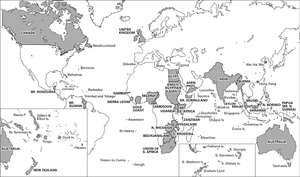A network of colonies, protectorates, and other territories that for about 300 years were subject to the British crown and administration. It was superseded by the British Commonwealth, a free association of mainly self-governing nations.
The first British overseas settlements were established in the 16th century and by 1670 there were colonies in America, in New England, Virginia and Maryland. Britain had conquered Jamaica and there were British communities throughout the Caribbean. British colonization was driven by trade, with the Hudson’s Bay Company making inroads into Canada and the East India Company setting up trading stations in India. The slave trade brought British merchants to west Africa. The empire was maintained by a strong navy and trade restrictions that kept the empire a closed economic system.
In 1800, although Britain had lost its 13 American colonies, it still retained Newfoundland, thinly populated parts of Canada, many West Indian islands, and other islands useful for trading purposes. It held Gibraltar from Spain and in 1788 had created a convict settlement in New South Wales, Australia. During the Napoleonic Wars Britain acquired further islands, for example Malta, Mauritius, the Maldives, and also Ceylon and Cape Colony, which was particularly valuable for fresh food supplies for ships on the way to the East. Most of these belonged to the East India Company, which was steadily developing and exploiting its trade monopoly in India and beyond. All such acquisitions were seen as part of the development of British commerce, as was to be the seizure of Hong Kong in 1841. From the 1820s, a new colonial movement began, with British families taking passages abroad to develop British settlements. In 1857 the Indian Mutiny obliged the British government to take over from the East India Company the administration of that vast sub-continent; in January 1877 Queen Victoria was proclaimed Empress of India. New tropical colonies were competed for in the “Scramble for Africa” and in the Pacific. In 1884 an Imperial Federation League was formed, seeking some form of political federation between Britain and its colonies. The scheme soon foundered, being rejected by the colonial Premiers when they gathered in London for the two Colonial Conferences of 1887 and 1897. Strategically, the key area was seen to be southern Africa, and it was the dream of Cecil Rhodes and Alfred Milner to create a single Cape-to-Cairo British dominion, linked by a railway, and acting as the pivot of the whole empire, a dream which faded with the Second Boer War. Another result of the Boer War was the creation of the permanent Committee of Imperial Defence (1902), whose function was to be the coordination of the defence of the empire, and which was to continue until 1938. The empire reached its zenith after World War I, when German and Ottoman mandates were acquired, and over 600 million people were ruled from London. In the later 19th century movements for home-rule had begun in all the White colonies. Starting in Canada, but spreading to Australasia and South Africa, such moves resulted in 1931 in dominion status for these lands. Although the Indian National Congress had been founded in 1885, attempts by the indigenous peoples of the empire to secure similar self-government proved more difficult. It was only after 1945 that the process of decolonization began, which by 1964 was largely complete. Most former colonies remained members of the Commonwealth of Nations after becoming independent. Sixteen Commonwealth members (other than Britain) recognize the British monarch as head of state; the others recognize the monarch as head of the Commonwealth. Queen Elizabeth II consented to the ending of constitutional links between Britain and Canada in 1982 and between Britain and Australia in 1986. Republican movements in Australia and New Zealand gained support during the 1980s and 1990s. Britain has 14 remaining dependent territories including Gibraltar, the Falkland Islands, and Bermuda, which rejected independence in a referendum in 1995. Hong Kong was handed back to China in 1997. King Charles III acceded to the throne following the death of Queen Elizabeth II in 2022.

British empire. This map shows the extent of the British empire in 1914.
- colon
- colonial discourse theory
- colonialism
- colonization window
- colonnade
- colony
- colony-stimulating factor
- colophony
- Colorado Student Space Weather Experiment
- colorimeter
- colorimetric analysis
- colorimetry
- colossal magnetoresistance
- Colosseum
- Colossus
- colostrum
- colour
- colourable
- colour blindness
- colour centre
- colour charge
- negative theology
- negative transmission
- negator
- negentropy